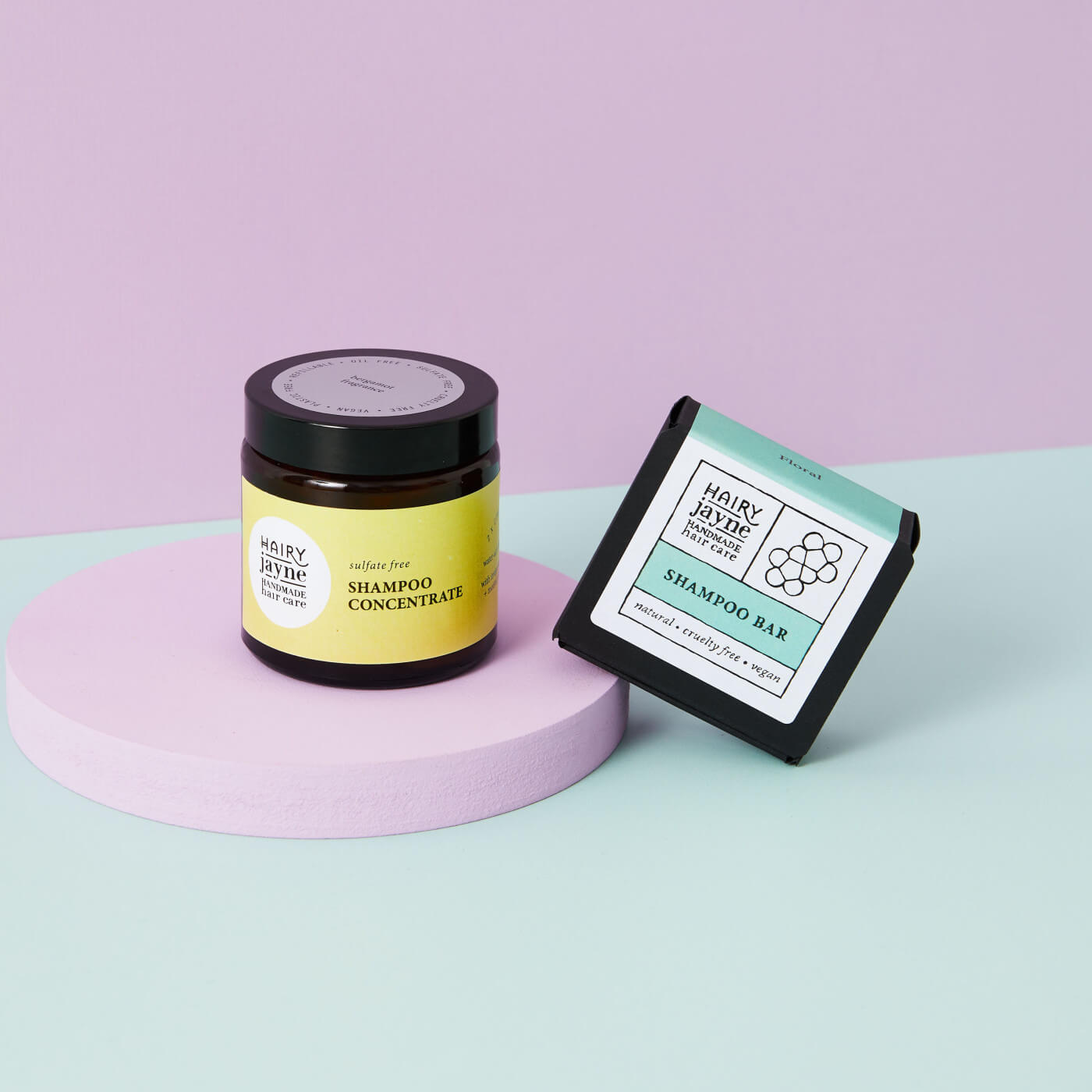In the vast landscape of hair care, choosing the right shampoo can be like navigating a maze. With shelves adorned with countless options, each claiming to be the perfect solution for your hair, it can be tricky to sift through the noise and make an informed decision. The shampoo you've picked up looks cute, smells lovely and seems to be for your hair type. If sustainability is as important to you as your hair, the quest for the ideal shampoo definitely involves understanding which ingredients to avoid in shampoo.
The Dilemma: Ingredients to Avoid in Shampoo
You've likely looked at a shampoo label and pondered, "Should what should I be avoiding in shampoo?" The journey begins with decoding the language of shampoo labels and some beauty-industry jargon. Let's delve into some common culprits that conscious consumers like you ought to steer clear of:
1. Sulphates: The Foaming Agents
Sulphates, such as Sodium Lauryl Sulphate (SLS) and Sodium Laureth Sulphate (SLES), are powerful foaming agents commonly found in shampoos. They are definitely ingredients to avoid in shampoo. While they create that luxurious lather we associate with cleanliness, they can also strip the hair of its natural oils, leaving it dry and prone to damage. Look instead for gentler and more natural alternative ingredients like Sodium Cocoyl Isethionate.
2. Parabens: The Preservatives
Parabens, such as methylparaben, ethylparaben, and propylparaben, are synthetic preservatives used to extend a product's shelf life. (Preservatives are only necessary if the shampoo contains water and not needed for ones without, like shampoo bars). Parabens have been a cause for concern due to their potential to disrupt the endocrine system. Opt for paraben-free (or preservative-free) shampoos to reduce exposure to these questionable chemicals.
3. Phthalates: The Fragrance Enhancers
Phthalates are commonly used to enhance the fragrance in many beauty products, including shampoos. However, these chemicals are known endocrine disruptors and have been linked to adverse health effects. If you love more natural, beneficial ingredients, skip the phthalates in favour of botanical essential oil blends.
4. Animal-Derived Ingredients
If you're looking for a vegan and cruelty-free shampoo, there are many animal-derived ingredients to look out for. Be sure to steer clear of ingredients like keratin (often sourced from animal hooves, feathers, or hair), lanolin (extracted from sheep's wool), and collagen (typically derived from animal connective tissues). Silk and honey are sometimes used in hair care, too. Opting for plant-based alternatives ensures your hair care routine aligns with your ethical values.
£9.50
Hairy Jayne solid shampoo bars are natural, plastic free, sulphate free, palm oil free, cruelty free and vegan. They lather up very well to cleanse the hair and nourish the scalp with Aloe Vera and Mango Butter. 98% naturally derived and biodegradable. Suitable for… read moreShampoo bar | for all hair types, sulphate free + vegan

The Rise of Sulphate-Free Shampoos
The term "sulphate-free shampoo" is often found on shampoo labels now. What exactly does this mean, and how can it benefit your hair? Let's break it down:
What are Sulphate-Free Shampoos?
Sulphate-free shampoos, as the name suggests, are formulations that omit sulphates from their ingredient list. These shampoos use alternative, milder cleansing agents to lift dirt and oil from the hair without the harsh stripping effect of sulphates. Sulphate-free options offer a gentle and effective cleansing solution that benefit both the health of your hair and the environment.
Benefits of Sulphate-Free Shampoos:
• Gentler on Hair:
Sulphate-free shampoos are known for being gentler on the hair and scalp. They clean without excessively stripping away natural oils, making them ideal for individuals with sensitive scalps or dry hair.
• Colour-Protecting:
For those who love experimenting with hair colour, sulphate-free shampoos are a game-changer. They help preserve vibrant colours for longer by preventing premature fading.
• Reduced Environmental Impact:
Sulphate-free detergents are often considered more environmentally friendly than their sulphate counterparts. Traditional sulphates can persist in water systems and may contribute to water pollution, affecting aquatic ecosystems. On the other hand, sulphate-free alternatives, crafted with milder cleansing agents usually derived from coconuts, have a reduced impact on water quality. Sulphate-free shampoos often come in eco-friendly packaging, too, reducing the environmental impact associated with traditional plastic shampoo bottles.
£6.00
Love the idea of sustainable shampoo bars but struggle with them? Our brand new refillable and nourishing Shampoo Concentrate is just for you. A 2x concentrated sulfate-free shampoo with added Green Tea extract and Aloe Vera to gently invigorate and cleanse. The oil-free formula… read moreShampoo concentrate | refillable + nourishing, for all hair types

Look for Paraben-Free
In your quest for the perfect shampoo, you may also have come across the term "paraben-free shampoo". Let's explore why paraben-free options have become a top choice for conscious consumers:
Why Go Paraben-Free?
• Endocrine System Concerns:
Parabens have been associated with potential disruptions to the endocrine system, which regulates hormones in the body. Choosing paraben-free shampoos is a proactive step to minimize exposure to these concerns.
• Environmental Impact:
Paraben-free shampoos contribute to reducing the presence of these chemicals in water sources, ultimately benefitting aquatic ecosystems.
• Transparency and Trust:
Paraben-free shampoos often go hand in hand with a commitment to transparency in labeling. This transparency builds trust in the brand's dedication to safer, more natural formulations.
Navigating the Ingredient List: A Mini Guide
As you embark on your journey to find the perfect shampoo, understanding how to decipher ingredient lists becomes a crucial skill. Here's a mini-guide to help navigate through the language of shampoo labels:
1. Look for natural oils and extracts
Shampoos enriched with natural plant oils like olive oil or extracts such as aloe vera and green tea extract align perfectly with a preference for sustainable and beneficial ingredients. In the UK is the law to list shampoo ingredients in INCI names. INCI stands for International Nomenclature Cosmetic Ingredients and which is a global system for identifying cosmetic ingredients. The shampoo ingredients are listed in order of concentration in the product. If in doubt, a quick google of an INCI name will give you the more common name.
2. Choose fragrance free or essential oils over synthetic fragrances
Opt for fragrance free shampoos or ones with essential oils blends for fragrance. Synthetic fragrances are generally safe for most people but can exacerbate any allergies. Synthetic fragrance is listed as "Parfum" on shampoo labels. When essential oils are used, any potential known allergens such as linalool, geranoil and citral must be listed at the end so that they can be avoided if necessary.
3. Check for these phrases or any certification seals
Phrases like "sulphate-free", "paraben-free", "cruelty-free", "vegan", "palm-free", "plastic-free" and "refillable" all provide assurance that the shampoo aligns with these preferences. "Natural" can sometimes be used on shampoo labels by marketers even though there aren't many natural ingredients high up on the ingredients list. It isn't a phrase that is particularly defined in the beauty industry, so knowing how biodegradable a shampoo is can be more helpful. Keep an eye out for "organic" certification seals, too.
3. Avoid ingredients with "PEG" in them
Another crucial consideration in the journey to decipher shampoo labels involves ingredients with "PEG" in them. Polyethylene glycols, abbreviated as PEG, are synthetic compounds often used in beauty products as emollients, thickeners, or moisture-carriers. However, PEG compounds can potentially be contaminated with harmful substances like ethylene oxide and 1,4-dioxane during the manufacturing process as they are derived from petroleum. These contaminants have been associated with adverse health effects. So choosing PEG-free shampoos is a proactive step in making informed choices about well-being and product transparency.
The Path to Informed Hair Care
As you continue your journey towards a more conscious and personalised hair care routine, armed with knowledge about ingredients to avoid in shampoo, you can now make more informed choices that align with your values. The beauty is not just in finding the perfect shampoo, but also in empowering yourself to curate a beauty routine that reflects your commitment to sustainability. Contributing to a larger movement toward transparency, sustainability, and mindful consumerism.
For more hair care tips and advice from Jayne, a former hairdresser, about how to get healthy hair - follow us on Instagram.

